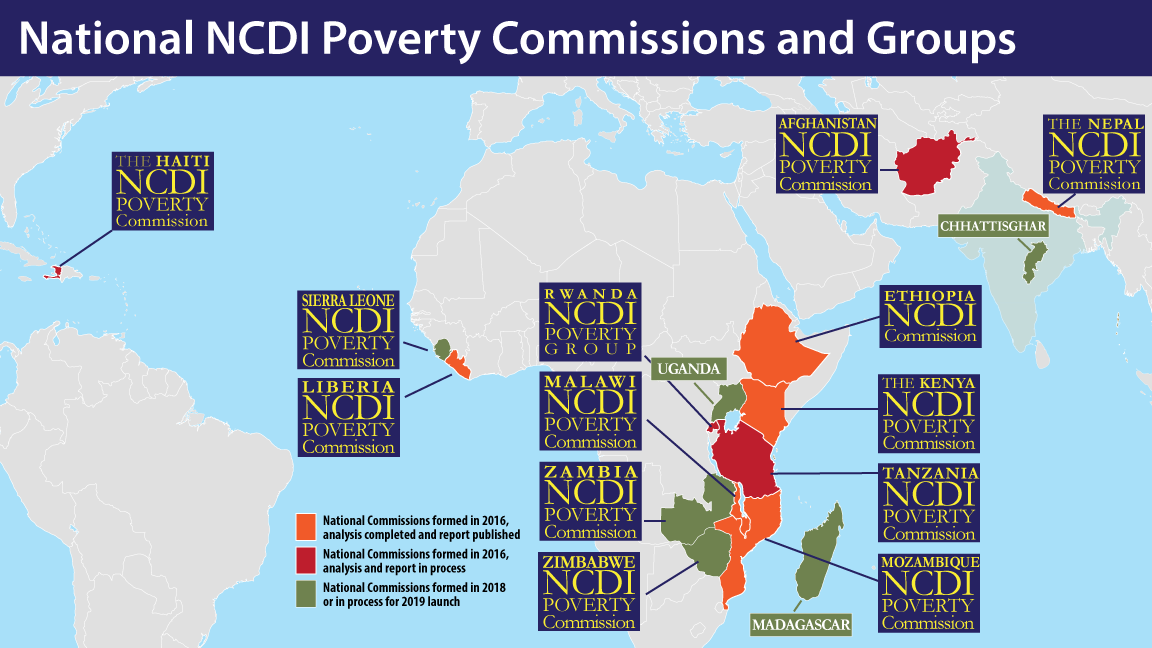Background
In recent years, NCDs and injuries have been identified as priorities both for global health and for equitable and sustainable development. UN High-Level meetings in 2011, 2014 and 2018 called for urgent action to address NCDs both as the leading causes of death and disability worldwide and as “one of the major challenges for development in the twenty-first century.”
Yet to date, global policies and funding devoted to NCDs have focused almost entirely on four diseases (cardiovascular disease, cancer, diabetes, and chronic respiratory disease) and four “lifestyle” behavioral risk factors – namely tobacco use, unhealthy diets, lack of physical activity, and alcohol abuse. This global agenda has effectively excluded the world’s poorest and most vulnerable populations, who suffer a heavy and avertable burden of NCDs that are not linked to preventable behaviors, including type 1 and malnutrition-associated diabetes, rheumatic heart disease, childhood cancers, asthma, chronic kidney disease, epilepsy, mental health conditions, trauma, and other severe and avertable conditions that disproportionately impact the poor.
A reframing is needed in the interest of equity so that global financing and policy-making institutions can address more fully the needs of the poorest patients in low-income countries.
The Lancet NCDI Poverty Commission
The Lancet Commission on Reframing NCDs and Injuries for the Poorest Billion (Lancet NCDI Poverty Commission) was launched in January 2016 to address what is both one of the most glaring inequities in global health and one of the most critical barriers to reaching global and national goals for universal health coverage and sustainable development — the crushing burden of noncommunicable diseases and injuries on the world’s poorest populations.
The Commission was formed with the hypothesis that the noncommunicable disease and injury (NCDI) burden experienced by those living in extreme poverty was different, but no less important, than the NCDI burden in other populations. The daily clinical experiences of many of the Commissioners working in rural health facilities in South Asia and sub-Saharan Africa had left a striking impression: namely, that NCDIs in these settings were an integral part of the death and suffering of the poorest; that these NCDIs struck young and nutritionally-deprived patients who were also vulnerable to infectious disease; and that the conditions grouped under the label of NCDIs were not dominated by a small number of diseases or “lifestyle” risk factors. The aim of the Commission is to rethink global policies, to mend a great disparity in health, and to broaden the NCDI agenda in the interest of equity.
lancet ncdi poverty commission members with representatives of national ncdi poverty commissions, advisers, and staff at a meeting in kigali, rwanda
The Commission brought together 23 leading NCDI researchers, clinicians, policy makers, and advocates from around the world, and was supported by the Program in Global NCDs and Social Change at Harvard Medical School and the NCD Synergies project of Partners In Health. The Commission was organized into four working groups with the following objectives:
to asses the scale and pattern of the NCDI burden among the poorest;
to identify and prioritize cost-effective, equitable interventions to address this burden;
to examine the state of NCDI financing in the countries where the poorest billion live; and
to better understand the history and current state of NCDI framing and governance at both global and national levels.
Drawing on the research and analysis of these working groups, the Commission developed key findings, messages, and recommendations that were presented in a report that was published and launched at an event in September 2020.
National NCDI Poverty Commissions and Groups
The Commission also helped establish National NCDI Poverty Commissions and Groups in 15 low- and lower-middle income countries that are home to almost half of the world’s poorest billion people. These National Commissions have conducted analyses to assess their national NCDI burden among the poorest and to identify and prioritize policies, interventions, and integrated delivery platforms that would effectively address and reduce that burden. They have also participated in a series of Knowledge Exchanges, engaging with presentations and discussion of topics critical to addressing NCDI Poverty via teleconferences organized and co-hosted by the Lancet NCDI Poverty Commission and the World Bank.
Six of the 10 countries that were invited to form National Commissions in 2016 have published and launched reports summarizing their findings and recommendations (see map above), with another four in process. Five additional countries and one Indian state (Chhattisgharh) are initiating Commission activities in 2019 after having participated in an NCDI National Poverty Commission Initiators’ Workshop in Dubai in December 2018.


